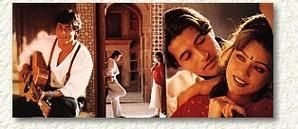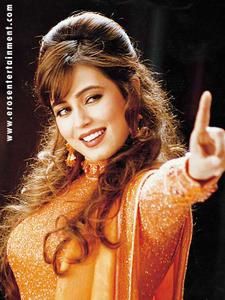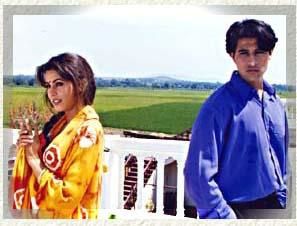Pardes - (Bad Bollywood)
Publié le 25 Février 2007
This 1997 film, compared to the one I’ve spoken about previously, will be my example of what is NOT so good about Bollywood. Careful: there are many films in Bolly, but well, I’ve just seen that one again.

It starts rather well, with Alok Nath, Amrish Puri as strong values, and the delightful Indian family in which Ganga (Mahima Chaudhary, in the prime of her beauty) shines like the moon in the summer sky (intentional masala metaphor ;-) (but true enough!). Then we have the sorry subplot with other rich Indian family who wanted to lay hands on Ganga; the hairy-chested, weight-lifting heir and prospective husband doesn’t reach the amusing level. His father is also something. Then the vulgar Ranjiv (Apoorva Agnihotri) is a sore spot, because he never achieves any convincing composition as the spoilt young American-Indian brat. What are we left with? SRK as Arjun doesn’t really do his best, he’s there, but rather nonchalantly. Obviously the film-maker (Subhash Ghai) has trusted him too much, and has not pushed him about too much. Mahima Choudhary for me is the one who does her best to perform: it was her first real role, so she puts in her maximum, which is not always very successful, but considering, it’s not bad at all.

What goes wrong, apart from the acting? Critics have lampooned the picture of American NRIs, which indeed is not really well done, they’re all (almost – there’s Kishorilal’s mum who’s the voice of wisdom) as bad as can be, and contrary to those in Aa ablaut chalen, no sense of a community exudes from them. They’re not even very bad, they’re just made to look bad, and we don’t believe in their badness (only Amrish Puri is rather convincing). Of course, I suppose I can be that harsh because I know that all Americans are not like what the film shows them to be, materialistic and vulgar. I am probably wrong sometimes when I marvel at or dislike Indian things, not knowing the context very well. But here, the anti-Americanism is just silly. And Indian nationalism has known better advocates. See Swades for example.
The singing and dancing is all right, I suppose… A little stilted perhaps. There are some good tunes, but nothing that I found worthy to record and keep. Sorry!

The biggest problem that I see in this type of film is lack of purpose. Love stories can be the best of stories if they are told and shown with the desire to explore the way individuals are confronted to this reality. But such an intention needs a careful evaluation of the subtleties needed to make the situation interesting to follow, and a conscious assessment of what actors do and don’t do. In Pardes, everything is much too predictable, much too exaggerated, too one-sided. Where are the indispensable nuances which the spectator is looking for if he wants to identify with the characters? Why does SRK have to play the role of his brother’s advocate? It hardly makes any sense. And that reversal of the father’s position in the end: how many times have we seen that? Such a “happy end” is sickening.
/image%2F1489169%2F20200220%2Fob_9722d6_banner-11.JPG)